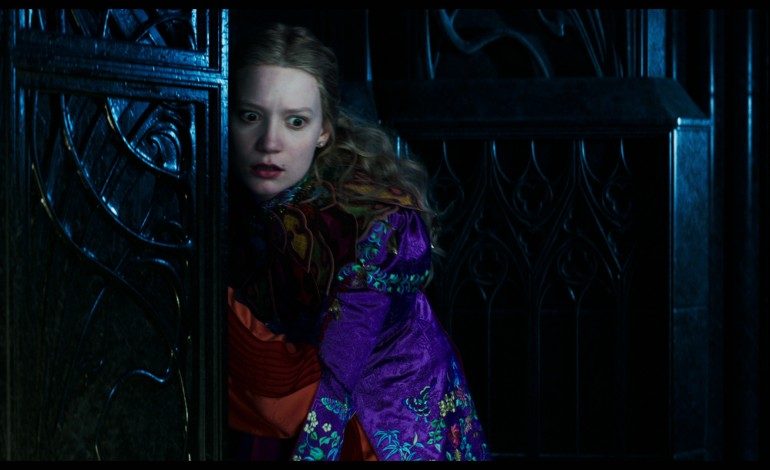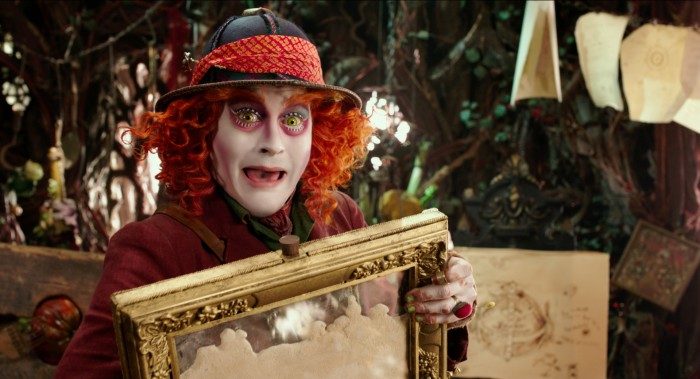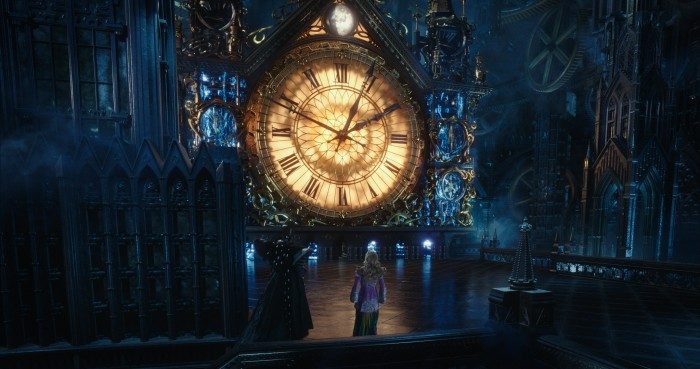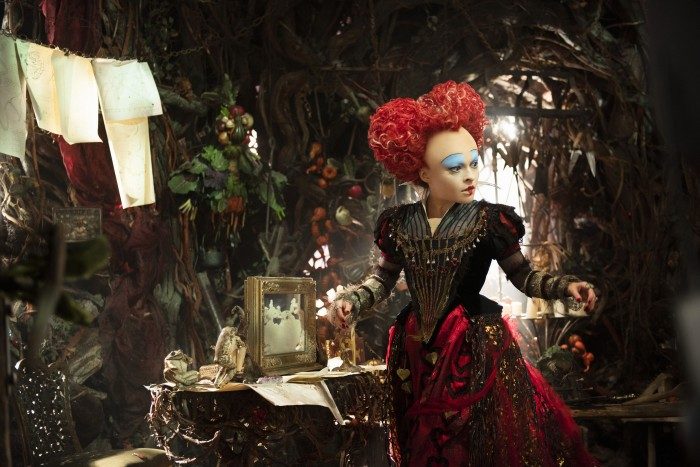

Hungry for more profits comes Disney’s Alice Through the Looking Glass. Disney long ago co-opted author Lewis Carroll’s immortal Alice’s Adventures in Wonderland stretching back to their classic 1951 animated film. In 2010, Tim Burton’s grandiose live-action version invade movie houses. A film as subtle as a barking dog that also featured one of the most dismal color palettes of the modern era, the flick, nonetheless, grabbed a billion dollars in box office receipts – aided, certainly by hitting cinemas right at the cusp of the 3-D boon (the first big-budget movie released in the format following James Cameron’s Avatar) and, inexplicably, won two Academy Awards for its overworked and tediously exhausting production and costume design. Suffice it to say, I was no fan, but really, who was? Yet as Carroll once wrote, “It’s no use going back to yesterday, because I was a different person then.”
Enters Alice Through the Looking Glass, a sequel that nobody was really clamoring for, this time with director James Bobin (The Muppets) in charge. The result: well, an improvement, but considering the low bar set by its predecessor, that may just be splitting hairs off the Mad Hatter’s colorfully coiffed head. The film is an easier and less finicky sit certainly, but unfortunately still a rather inert piece of pop filmmaking. One that’s seemingly more interested in keeping a cash-cow afloat rather than inciting much sense of imagination or a sense of well, wonder. We move from one elaborate set piece to another – led again by Mia Wasikowska’s proto-feminist Alice – but are left with precious little to marvel at despite abundant bits of production design clearly sculpted and processed with care.
Laudably, the plot this time, is at least a tad more streamlined if still a bit maddeningly difficult to articulate. Alice Kingsleigh, headstrong and in charge, in the film’s 1875 “reality” is now a worldly sea captain. Steely and unnerved by the impossible in her element at sea, she finds herself brought down to earth upon learning her mother (played by Lindsay Duncan) has mortgaged the Kingsleigh estate which forces an uncomfortable choice between saving their home or Alice’s beloved Wonder, the ship bequeathed to her from her late father. With such tensions – which include a forced argument with her protective mum and an awkward encounter with the stuffy Hamish (Leo Bill), her former fiancé – Alice welcomes a diversion and one comes in the shape of a digital blue butterfly (voiced by the late Alan Rickman) who whisks her back into Wonderland – natch Underland, as the last movie arbitrarily, yet bluntly corrected.
Placed back into her hallucinatory playground, Alice learns all is not quite as it should be despite the banishment of the wicked Red Queen (though Helena Bonhman Carter does return in the role for more pin-head shaped grandstanding), as the Mad Hatter (Johnny Depp) has gone madder (or sickly…or well it’s hard to really tell). He insists that his family – believed to have parted after the great Jabborwocky scare in the last outing – is alive and in need of rescue. To up the hi-jinks and one thinks to help combat franchise inertia, Bobin, returning screenwriter Linda Woolverton and company contort Alice Through the Looking Glass into a time travel movie offering flashes of Underland’s quirky citizens in earlier times. While time itself is a theme of sorts (and even personified by Sacha Baron Cohen), there’s a note of the familiar as it plays out. What really transpires are easy characters deductions, a fairly trite message (old school gems like “you can’t change the past, only learn from it”) and blatant cribs of many former proprieties from Back to the Future to Wicked to one unfortunate visual gag that plays derivative of the Transformers franchise.
Magic, or a sense of it, may be the game plan here but isn’t particularly plentiful in this noisy and awfully busy movie. Which isn’t necessarily to say there’s anything really wrong here from a fundamental filmmaking point of view. Bobin, with two Muppets movies under his hat and experience on the comedy series Flight of the Conchords, keeps things ticking (including the screenplay’s plethora of time clock puns) on a fairly even click and admirably steers the clearly expensive machine through its course. The production elements – from the sets, costumes, visual effects, even performances – are tighter and more controlled than under Burton’s hand six years prior; it’s prettier and far less grating too which is appreciated. What’s missing is a sense of magic, that child-like sense of wonder, endless possibility and limitless imagination. Instead, we get an on-the-nose, overly literal adventure story that sorely misunderstands not just its source material but also its audience.
Each character, or more precisely each caricature, is more or less sapped of their inherent oddness. The Mad Hatter can’t simply be a kook without explanation, but because of long-internalized “daddy don’t get me” woes. The Red Queen, by comparison, isn’t so bad either, but really more misunderstood just as her ethereal counterpart The White Queen (played by a returning Anne Hathaway) isn’t quite so nice. The performers know what they are doing and ham and haw accordingly; strikingly Depp is nearly understated despite pounds of make-up, yet Alice Through the Looking Glass doesn’t really extend many favors to anyone. By contrast Wasikowska, an elegant actress perhaps more in her element in smaller, more truly strange movies like Stoker and Maps to the Stars, may be a bit too poker faced. Like much else in the movie, she’s all dressed up (and looks beautiful) but has no place to go.
Verdict: 2 out of 5
Pitted against the previous film, Alice Through the Looking Glass is superior in nearly every way – in look, shape and scope, but it’s a still rather pedestrian family adventure, even if it may work as an adequate babysitter. What’s lost inside it’s derivative (but occasionally diverting) spectacle is a genuine sense of wonder. Putting aside ambition, there’s hardly a sense of joy or anything the least bit fresh in the entire movie. Wonderland should never feel like business as usual, and yet here it is. Curiouser and curiouser, indeed.



